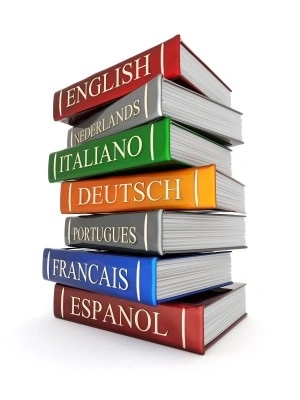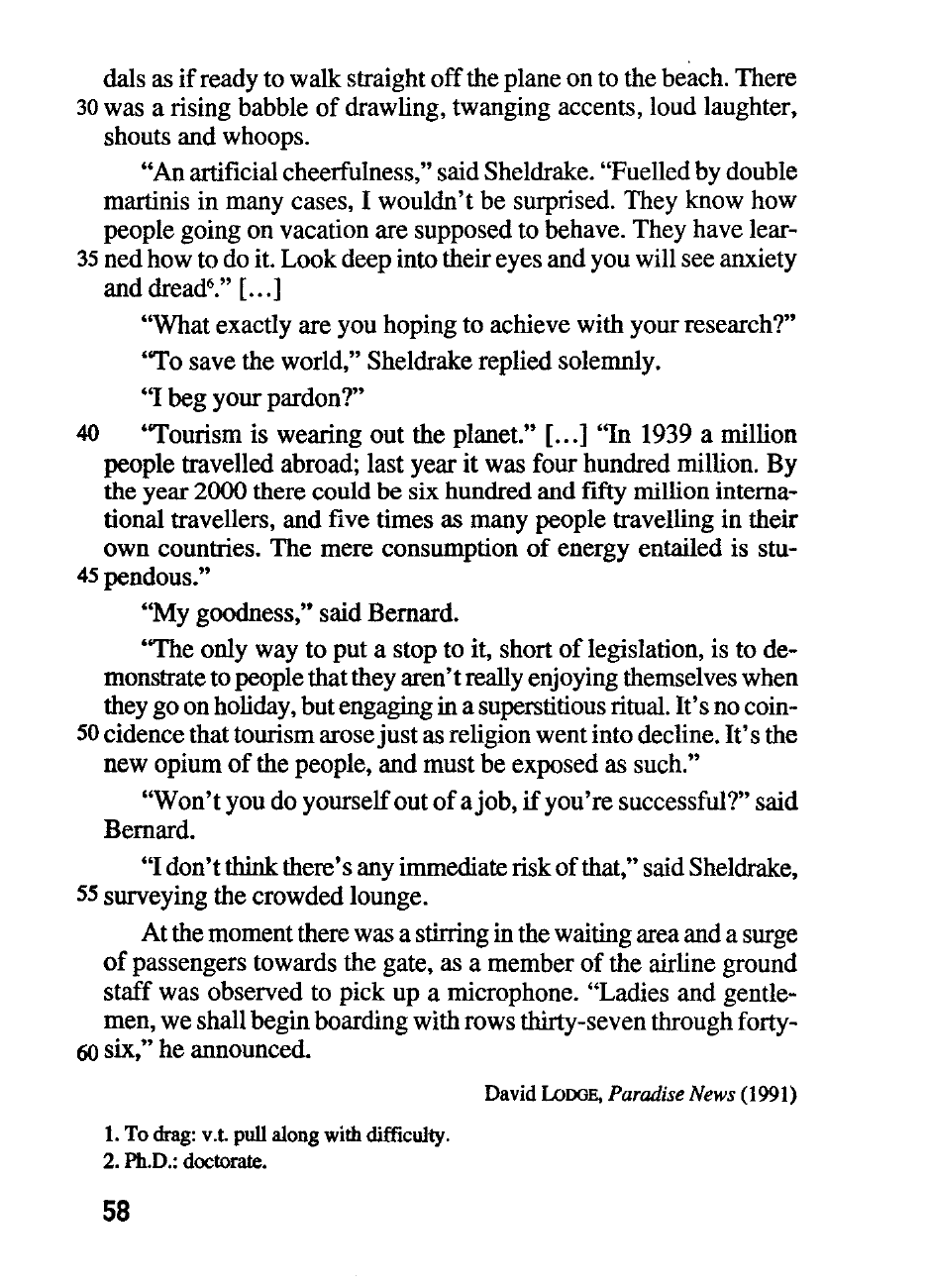ÉTRANGER — GROUPE 1, SESSION DE JUIN 1995 LANGUE VIVANTE 1- SÉRIES L ET ES/S
Publié le 09/08/2014

Extrait du document

SUJET 6
1. Compréhension de l'écrit
Lire attentivement le texte cl-dessous puis répondre aux ques-dons.
"I always hated holidays, even as a kid. Such a waste of time, sitting on the beach, making sandpies, when you could be at home doing some interesting hobby. Then, when I got engaged, we were both students at the time, my fiancée insisted on dragging' me off
5 to Europe to see the sights: Paris, Venice, Florence, the usual things. Bored the pants off me, till one day, sitting on a lump of rock beside the Parthenon, watching the tourists milling about, clicking their cameras, talking to each other in umpteen different languages, it suddenly struck me: tourism is the new world religion. Catholics,
10 Protestants, Hindus, Muslims, Buddhists, atheists — the one thing they have in common is they all believe in die importance of seeing the Parthenon. Or the Sistine Chapel, or the Eiffel Tower. I decided to make in my Ph.D.2 subject. Never looked back. Now, the Travelwise package is a research grant in kind. The British
15 Association of Travel Agents are paying for it. They think it's good PR' to subsidiep a bit of academic research now and again. Little do they know." He grinned mirthlesslr again.
"What d'you meanr
doing to tourism what Marx did to capitalism, what Freud
20 did to family life. Deconstructing it. You see, I don't think people really want to go on holiday, any more than they really want to go to church. They've been brainwashed into thinking it will do them good, or make them happy. In fact surveys show that holidays cause incredible amounts of stress."
25 "These people look cheerful enough," said Bernard, gesturing
at the passengers waiting to board the flight to Honolulu. There were now quite a lot of them, as die time of departure neared: mostly Americans, dressed in garisle casual clothes, some in shorts and san‑
57
dais as if ready to walk straight off the plane on to the beach. There 30 was a rising babble of drawling, twanging accents, loud laughter, shouts and whoops.
"An artificial cheerfulness," said Sheldrake. "Fuelled by double martinis in many cases, I wouldn't be surprised. They know how people going on vacation are supposed to behave. They have lear‑
35 ned how to do it. Look deep into their eyes and you will see anxiety and dread6." [...]
"What exactly are you hoping to achieve with your research?"
"To save the world," Sheldrake replie(' solemnly.
"I beg your pardon?"
40 "Tourism is wearing out the planet." [...] "In 1939 a million
people travelled abroad; last year it was four hundred million. By the year 2000 there could be six hundred and fifty million international travellers, and rive times as many people travelling in their own countries. The mere consumption of energy entailed is stu‑
45 pendous."
"My goodness," said Bernard.
"The only way to put a stop to it, short of legislation, is to de-monstrate to people that they aren't really enjoying themselves when they go on holiday, but engaging in a superstitious ritual. It's no coin‑
50 cidence that tourism arose just as religion went into decline. It's the new opium of the people, and must be exposed as such."
"Won't you do yourself out of a job, if you're successful?" said Bernard.
"I don't think there' s any immediate risk of that," said Sheldrake, 55 surveying the crowded lounge.
At the moment there was a stirring in the waiting area and a surge of passengers towards the gate, as a member of the airline ground staff was observed to pick up a microphone. "Ladies and gentlemen, we shall begin boarding with rows thirty-seven through forty‑
60 six," he announced.
David LODGE, Paradise News (1991)
1. To drag: v.t. pull along with difficulty.
2. Ph.D.: doctorats.
58
3. PR: public relations.
4. Grin: v.i./n.: (give) broad Mirth: n. merriment, gaiety.
5. Garish: adj.: showy, ostentatious
6. To dread: v.t. fear greatly / n. terror.

«
dals as if ready to walk straight off the plane on to the beach.
There
30 was a rising babble of drawling, twanging accents, loud laughter,
shouts and whoops.
"An artificial cheerfulness," said Sheldrak:e.
"Fuelled by double
martinis
in many cases, I wouldn't be surprised.
They know how
people going
on vacation are supposed to behave.
They have lear-
35 ned how to do it.
Look deep into their eyes and you will see anxiety
and dread 6." [ ••• ]
"What exactly are you hoping to achieve with your research?"
''To save the world," Sheldrak:e replied solemnly.
"I beg your pardon?"
40 ''Tourism is wearing out the planet." [ ...
] "In 1939 a million
people travelled abroad; last year
it was four hundred million.
By the year 2000 there could be six hundred and fifty million interna
tional travellers, and five times as many people travelling
in their
own countries.
The mere consumption of energy entailed is stu-
45 pendous."
"My goodness," said Bernard.
''The only way to put a stop to it, short of legislation, is to de
monstrate to people that they aren't really enjoying themselves when
they
go on holiday, but engaging in a superstitious ritual.
It' s no coin-
50 cidence that tourism arose just as religion went into decline.
It' s the
new opium
of the people, and must be exposed as such."
"Won't you do yourself out of a job, ifyou're successful?" said
Bernard.
"I don't think there' s any immediate risk of that," said Sheldrak:e,
55 surveying the crowded lounge.
At the moment there was a stirring in the waiting area and a surge
of passengers towards the gate, as a member of the airline ground
staff was observed to pick
up a microphone.
"Ladies and gentle
men,
we shall begin boarding with rows thirty-seven through forty-
60 six," he announced.
David LoooE, Paradise News (1991)
1.
To drag: v .t.
pull along with difficulty.
2.
Ph.D.: doctorate.
58.
»
↓↓↓ APERÇU DU DOCUMENT ↓↓↓
Liens utiles
- ÉTRANGER-GROUPE 2*, SESSION DE JUIN 1995 LANGUE VIVANTE I
- ÉTRANGER — GROUPE 2, SESSION DE JUIN 1995 LANGUE VIVANTE 1- SÉRIE L
- ÉTRANGER — GROUPE 1, SESSION DE JUIN 1995 LANGUE VIVANTE 2 - SÉRIE L
- ÉTRANGER-GROUPE 1, SESSION DE JUIN 1995 LANGUE VIVANTE I
- ANTILLES — GUYANE, SESSION DE JUIN 1995 LANGUE VIVANTE 1- SÉRIES L ET ES/S
















